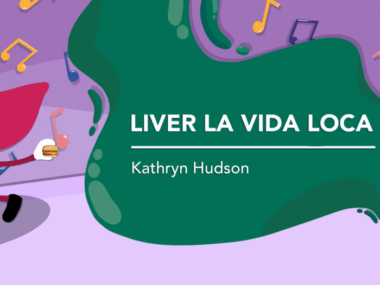Pemvidutide shows benefit for MASH in Phase 2b clinical trial
MASH resolved for many without fibrosis worsening
Written by |

Pemvidutide resolved metabolic dysfunction-associated steatohepatitis (MASH), a severe form of fatty liver disease, without worsening liver scarring (fibrosis) for more than half of people in a Phase 2 trial, outperforming a placebo and meeting one of the study’s main goals.
Six-month data from the year-long Phase 2b IMPACT clinical trial (NCT05989711) also showed signs that the Altimmune therapy candidate can reduce liver fibrosis and body weight.
While group differences for the other main goal, achieving fibrosis reduction without MASH worsening, didn’t reach statistical significance, the company believes further benefit will be seen with a longer treatment period.
“These data represent an important step forward in the development of pemvidutide for the treatment of MASH and reinforce our conviction in its potential to disrupt the treatment paradigm in this serious and rapidly growing disease,” Vipin K. Garg, PhD, president and CEO of Altimmune, said in a company press release. “We are excited to continue our efforts to bring this potentially transformative therapy to MASH patients.”
Additional trial data are due by year’s end, and the company is looking at future plans for pemvidutide’s clinical development.
Phase 2b clinical trial marks ‘clear path’ to Phase 3
“We believe that there is a clear path to a successful End of Phase 2 meeting with the [U.S. Food and Drug Administration] in the fourth quarter of 2025, enabling rapid progression to Phase 3,” said Scott Harris, MD, Altimmune’s chief medical officer.
Metabolic dysfunction-associated steatotic liver disease (MASLD) is a condition wherein fat abnormally accumulates in the liver, typically in the context of cardiometabolic risk factors such as obesity or type 2 diabetes.
MASH is a more severe form of the disease in which liver inflammation and fibrosis can lead to serious liver damage and related fatty liver disease symptoms.
Pemvidutide works by simultaneously activating the GLP-1R and glucagon receptor (GCGR) proteins. GLP-1R, which regulates food intake and body weight, is targeted by other therapies in development for MASLD/MASH. But pemvidutide is unique in its actions on GCGR, a protein that’s involved in liver fat metabolism and energy expenditure.
The therapy, given via under-the-skin (subcutaneous) injections, was found to significantly reduce liver fat and body weight over a placebo among overweight or obese people with MASLD in a previous Phase 1 clinical trial (NCT05006885).
IMPACT enrolled 212 people with biopsy-confirmed MASH and moderate to severe liver fibrosis, with or without diabetes. They were randomly assigned to receive weekly subcutaneous injections of either pemvidutide at one of two doses (1.2 mg or 1.8 mg) or a placebo for 48 weeks (nearly a year).
The study had two main goals, measured after 24 weeks (about six months): to see more people on pemvidutide than the placebo achieve MASH resolution without liver fibrosis worsening, or reductions in fibrosis without MASH worsening.
Significantly more people given the low dose (59.1%) or high dose (52.1%) of pemvidutide achieved MASH resolution without liver fibrosis compared with those on the placebo (19.1%), meeting this main goal.
Although more people in the low-dose (31.8%) and high-dose (34.5%) pemvidutide groups achieved fibrosis reduction without worsening MASH compared with those in the placebo group (25.9%), the difference did not reach statistical significance.
Around a quarter of people in either pemvidutide group achieved MASH resolution and fibrosis reduction, compared with 13.5% of the placebo group, but again these differences failed to reach statistical significance.
A separate, artificial intelligence-powered analysis indicated statistically significant reductions in liver fibrosis with pemvidutide, with 30.6% of people given the high dose achieving at least a 60% reduction compared with 8.2% of those on placebo.
Statistically significant benefits of both doses of pemvidutide were observed in other non-invasive fibrosis measures.
The investigational treatment led to significantly greater reductions in body weight compared with the placebo (5%-6.2% vs. 1%), meeting a key secondary goal.
Pemvidutide also led to significantly greater reductions in liver fat and biomarkers of liver inflammation. Blood sugar remained stable, regardless of the presence of diabetes.
“The combination of MASH resolution and weight loss achieved at only 24 weeks is unique among drugs in development for MASH,” said IMPACT principal investigator Mazen Noureddin, MD, a professor of medicine and hepatologist at Houston Methodist Hospital.
While the main outcome measure related to liver fibrosis reductions wasn’t met, the company said the data suggest a high likelihood that the treatment can ease liver fibrosis, and that further benefit will be observed with a longer treatment duration.
Pemvidutide was generally well tolerated, with no serious adverse events considered related to the treatment.
According to Noureddin, the therapy demonstrated “one of the lowest rates of [adverse event-related] drug discontinuations observed in any MASH clinical trial to date.”
Additional trial analyses are ongoing, and a 48-week data readout for IMPACT is expected by the fourth quarter.



